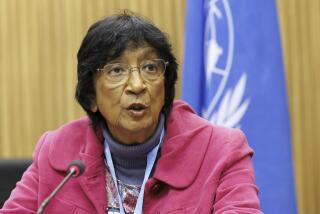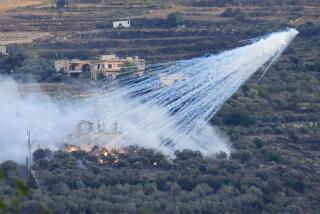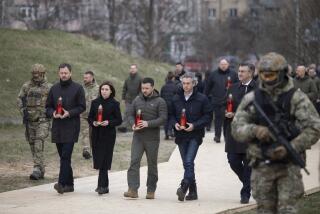Silent World Fuels Growth of Chemical Arsenals
- Share via
On Aug. 1 an independent team of experts appointed by the United Nations issued a report condemning Iraq for using chemical bombs containing mustard gas and other substances against Iran. Utilization was “repeated” and had “become more intense and frequent.” The team found evidence of relatively minor injuries caused by mustard gas in Iraq, but did not endorse Iraqi allegations that they were the result of Iranian actions.
Because the United Nations is also expected to perform mediation and conciliation functions, its fact-finding commissions are cautious about condemning a member state. The organization is understandably concerned about reducing its effectiveness by alienating or losing the confidence of one of the warring parties. In view of this, the clarity of the experts’ condemnation is all the more striking. It is beyond doubt that Iraq made intensive and continuous use of chemical weapons. They appear to have been a significant, if not decisive, factor in recent Iraqi advances. They were reportedly used even after the report was issued.
Chemical weapons are effective against adversaries that don’t have them. In 1896 the Ethiopians routed the Italian army at the battle of Adowa. Four decades later Benito Mussolini sent an expeditionary force with chemical weapons and rapidly conquered and occupied Ethiopia. The evidence suggests that Iraq was losing the war that it had started against Iran until it began to use chemical weapons.
After the frightening experience with chemical weapons during World War I, they were prohibited in 1925 by a widely adopted protocol that has since become customary international law. Of course, law is worth something only if it is effective. The ultimate sanction for the protocol, as for all international law, rests on the expectation that the world community will respond harshly and unequivocally to violations. Not only nations are involved in this complex enforcement process. The media play a major role in informing both the public and governments of events and supplying appropriate characterizations of unlawfulness.
In the case of Iraq the system did not work, but not for lack of information. The United Nations on Tuesday issued another report charging Iraq with the use of mustard gas against Iranian civilians in early August. The increasing accumulation of evidence of violations, including previous U.N. reports, was printed but without significant condemnation. In July, Iraqi Foreign Minister Tarik Aziz said openly and without apology at a press conference in Bonn that his government was using chemical weapons. No reaction. The New York Times didn’t even headline the final U.N. report; it tucked it into a story on Javier Perez de Cuellar’s negotiation efforts.
The big international players who should have been shrieking were content to let Iranians suffer and Iraq benefit from the use of chemical weapons. The United States, a tacit ally of Iraq in the late stages of the war, never used its considerable influence on Baghdad, or on the Arab governments that it’s financially dependent on, to stop using the weapons. Of course, there were ceremonial slaps on the wrist. In May the Security Council called for the strict observance of the protocol by both parties. The message was clear to Saddam Hussein.
The fact that Iraq has been neither condemned nor sanctioned by the international community for its use of chemical weapons has grave implications for arms control and, more generally, for the way we can expect future wars to be fought. Security specialists everywhere must conclude that adversaries will produce these weapons and use them with impunity. Hence they will insist that their governments produce and stockpile the same weapons.
Just as the world community concluded that there were too many nuclear weapons and has begun to try to reduce them, it has acted to encourage the proliferation of chemical weapons. In many ways that’s worse. The diffusion of nuclear weapons is still somewhat limited by the need for a scientific and technological base. Not so for chemical weapons. Garden or hothouse variety, they can be cooked up by nations of all sizes and industrial sophistication. And their military potential grows with advances in biochemistry.
The international reaction to Iraq’s use of chemical weapons has replaced a policy of security by the elimination of chemical weapons with one of deterrence by the production of chemical weapons. It’s the good old system of mutually assured destruction. But their ease of proliferation makes MAD dynamics for chemical weapons even crazier than for nuclear weapons. Perhaps part of the damage might be repaired by thunderous condemnation of Iraq by international organizations and individual states and an insistence that it pay appropriate compensation. That might not help, but it’s clear that a failure to do something would reap the whirlwind.
More to Read
Sign up for Essential California
The most important California stories and recommendations in your inbox every morning.
You may occasionally receive promotional content from the Los Angeles Times.













